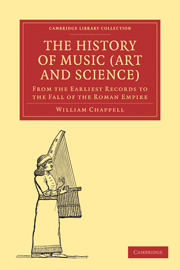Summary
Greek music cannot be considered as one of those subjects of ancient history with which modern science and art have but little concern, for not only has it been the progenitor of the musical system of Europe, but even now it is largely adopted, without improvement or change.
It will on that account be convenient to explain it by the terms of modern art, so soon as identity of meaning shall have been established, and thus relieve the reader from a mass of ancient technicality. Such terms, also, as relate to modern practice will be explained pari passu, for, although familiar to musical readers, it is an object to be even more widely intelligible. Dr. Burney described Greek music as “a dark and difficult subject” and one that had “foiled the most learned men of the two or three last centuries” (History, i. 7.); but no other difficulties really existed either for him or for them, than in certain words, and in the ancient technicalities. The music itself is simple in the extreme. The same comment will apply to Sir John Hawkins's remark, that “Even at this day the ablest writers on the subject do not hesitate at saying that the doctrine of the [Greek] modes is absolutely inscrutable.” (History, i. 236, 4to.)
- Type
- Chapter
- Information
- The History of Music (Art and Science)From the Earliest Records to the Fall of the Roman Empire, pp. 23 - 38Publisher: Cambridge University PressPrint publication year: 2009First published in: 1874



